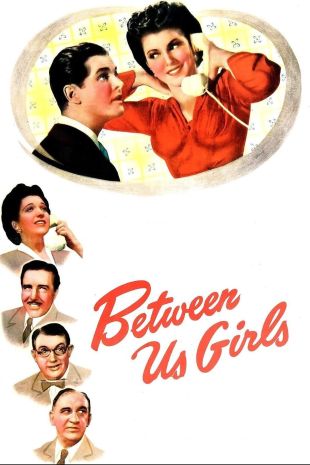Between Us Girls was to be a showcase for Diana Barrymore as a romantic comedy lead, and present her work in roles ranging from a 12-year-old girl to Joan of Arc, Queen Victoria, and Sadie Thompson. It was to be a comedy of mistaken identity that would intersect as much with modern screwball comedy as it would with Shakespeare's +As You Like It. Instead, it showcased the fact that Barrymore was no Ginger Rogers, and producer/director Henry Koster was no Billy Wilder -- and, most of all, that Between Us Girls was definitely not The Major And The Minor, the delightful Wilder/Rogers mistaken identity comedy of the previous year. For starters, the tone of the picture is off in a lot of the scenes, with many of the slapstick and zany moments pitched wrong -- just "off" enough to be disturbing to modern viewers -- and the pacing in the last 20 minutes leaden. Additionally, Robert Cummings as the male lead is a little too dour and serious, and never seems to be in the spirit of the piece. Much more successful is Kay Francis as Barrymore's mother -- she makes a fine second lead here and is great to look at, recalling Claudette Colbert in the same era. Andy Devine gets lots of comic mileage out of his supporting role as the manager to Barrymore's Caroline Bishop, and gets some of the best lines in an otherwise flat comedy, and even gets to show off his ability as a fast-talk artist; and Andrew Tombes as a doctor who stumbles on the masquerade and, for reasons that aren't obvious at first, doesn't tell what he knows -- indeed, his is the best performance in the entire movie. Walter Catlett also shows up as a police desk sergeant, with a fine comic edge in his scenes. Although no one could have known it at the time of its release, the script of Between Us Girls contained too many resonances to Barrymore's own private stuggles and personal demons -- ironically, it was the allusions to roles such as Sadie Thompson, Queen Victoria, and Joan of Arc that were supposed to be allusions to the reality of Barrymore's presence. The movie also appears to have dropped out of distribution since the 1950's, and hasn't been seen on television (or anywhere else) since.

Between Us Girls (1942)
Directed by Henry Koster
Genres - Comedy |
Release Date - Sep 4, 1942 (USA - Unknown), Sep 4, 1942 (USA) |
Run Time - 88 min. |
Countries - United States |
MPAA Rating - NR
Share on